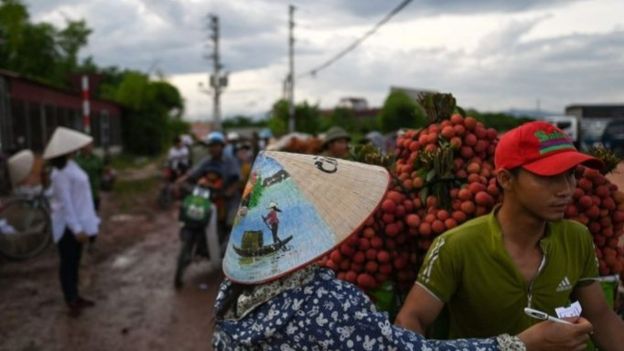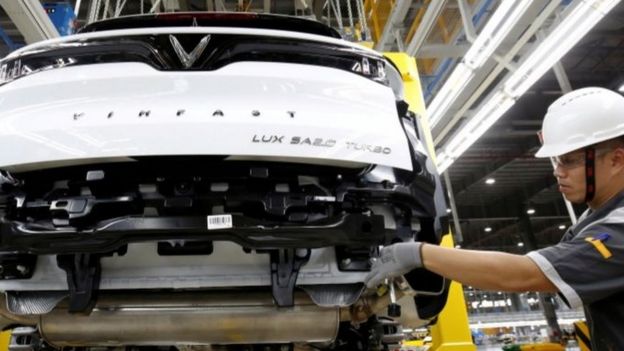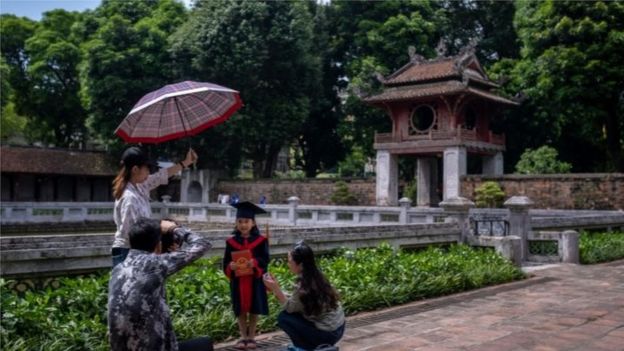
| Looking back Vietnam economy 2016-2020: Japanese experts perspective |
|
Date: 7/2/2020 9:02:27 AM VIETNAM IS CONSIDERED INTERNATIONALLY A SUCCESS STORY OF THE WORLD, WHEN ECONOMIC GROWTH HAS BEEN AT THE TOP OF THE WORLD FOR THE PAST DECADE, ACCORDING TO WORLD BANK DATA. In the context of the upcoming 5-year leadership transition at the 13th Party Congress, this is also an opportunity to look back on Vietnam’s economy from 2016 to the present. Ms. Mai Fujita, an expert from the Institute of Developing Economies, Chiba City, Japan, has spent many years studying Vietnam. Her agency, Institute of Developing Economies, founded in 1960, belongs to the Japanese Ministry of Economy, Trade and Industry.  Image copyrightAFP Image copyrightAFP’Ensuring an equal business environment’Dr. Mai Fujita pointed out some economic priorities of the Vietnamese government since the 12th Party Congress in 2016. "Renewing the growth model, which previously relied heavily on labor and capital, shifting to a model based on productivity improvement, has been a key agenda since the 11th Party Congress in 2011. "In the first half of the decade (2011-2015), Vietnam focused on recovering from macroeconomic instability and slow growth due to the global financial crisis and the failure of state-owned corporations. "The agenda for the period 2016-2020 includes ensuring a fair and transparent business environment for all economic sectors, promoting environmental sustainability, focusing on creativity. the structure of state-owned enterprises, the financial sector and public investment - these delays have dragged back the Vietnamese economy. "  Image copyright Image copyrightDr. Mai Fujita said Vietnam’s economic indicators over the past time were "impressive". Vietnam has actively participated in the global value chain, trade activities are increasingly integrated with major partners in North America, Northeast Asia and Europe. The property of the people has increased over time. The World Bank estimates that the "consumer" class, spending $ 5.50 or more per person per day, has grown from about 49% in 2010 to more than 70% in 2016. From 2002 to 2018, GDP per capita increased by 2.7 times, reaching over US $ 2,700 in 2019. Ms. Mai Fujita commented: "Growth accelerated thanks to exports of foreign invested sector (FDI) and strong domestic consumption." "The state of state-owned enterprises, public debt and the financial sector also improved." However, reforms in recent years also have limitations. "Vietnam’s labor productivity seems to lag behind regional peers, showing that Vietnam has only made limited progress in renewing its growth model." "Despite administrative reform efforts to make the business more open, there are still concerns that it is sufficient to ensure a transparent and fair business environment." Dr. Mai Fujita also pointed out: "An important development for the period 2016-2020 is the rise of large groups of private enterprises in areas where the state is strictly controlled." "It seems that these groups are difficult to develop without some level of political support."  Image copyrightS Image copyrightSPersonnel issues are very interested in the upcoming 13 Party Congress in 2021. Dr. Mai Fujita said: "Prime Minister Nguyen Tan Dung, since taking office in 2006, strongly promotes the establishment of large state corporations." "The situation changed after Mr. Dung retired in 2016. The anti-corruption campaign of General Secretary Nguyen Phu Trong has arrested and prosecuted many high-ranking officials and leaders of state enterprises." "However, during this same period, there was the rise of large private enterprises, as I mentioned above." "Perhaps it is because policy making continues to be influenced by the linkage between political and commercial interests, no matter who holds the highest positions."  Image copyright Image copyright’Development priority’The BBC asked Ms. Mai Fujita to make predictions about economic priorities for the new cabinet following the 13 th Congress in 2021. "Economic growth plays a key role in the legitimacy of the regime," she said. "Vietnam has been very successful in controlling the Covid-19 epidemic compared to many countries in the region." "However, the Vietnamese economy is closely linked to the global and regional economy, so the negative impact of the disease is inevitable." "So I think Vietnam’s priority will be how to recover quickly. It can be said that Vietnam is ready to take advantage when multinational corporations move and reorganize global supply chains. . " "However, Vietnam also needs to pay attention to how economic growth benefits all, and more equality for the people," said Dr. Mai Fujita. Thus, it can be said that continuing to reform to bring people’s income closer to some countries in the region, and minimize the impact of growth on the environment, will be a challenge for Vietnam’s next leadership. . |
| (Source: BBC-TiengViet) |